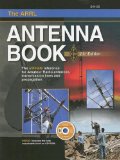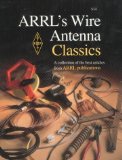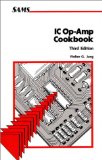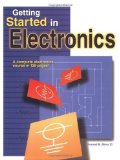These are some of the best books there are on electronics theory and practice.
  |
The ARRL Handbook for Radio Communications
The comprehensive Radio Reference — over 1,250 pages.
Since it was first published in 1926, The ARRL Handbook has been a core
resource for radio amateurs, hobbyists, engineers, and scientists. The Handbook
is the single most authoritative reference on practical communications topics
and is both a reference book and a tutorial—woven together with practical
applications and solutions. Highly Recommended.
Table of Contents: Electrical Fundamentals, Analog Basics, Digital
Basics, RF Design Techniques, Computer-Aided Circuit Design, Power Supplies,
Modulation, Oscillators and Synthesizers, Mixers, Modulators and Demodulators,
RF and AF Filters, Receivers, Transmitters, Transceivers, DSP and Software Radio
Design, Digital Modes, RF Power Amplifiers, Repeaters, Propagation of Radio
Signals, Transmission Lines, Antennas, Component Data and References, Circuit
Construction, Station Accessories, Test Equipment and Measurements,
Troubleshooting and Repair, Electromagnetic Compatibility and Direction-Finding,
Safety, Assembling a Station, Space Communications, Digital Communications,
Image Communications |
 
|
The Art of Electronics
This 1,100 page hardcover survey of electronics, written by a couple of Harvard
professors (one of whom is a founder of SETI!), is expensive and worth it--a
great and surprisingly readable (they keep the math to a minimum) overview of
electronic theory and circuit design. Highly recommended. |
 
|
The ARRL Antenna Book
THE antenna reference book from the American Radio Relay League. If you're
interested in antennas, you need and will love this book. Highly recommended. |
 
|
ARRL's Wire Antenna Classics
Here is an entire book devoted to wire antennas, from the simple to the complex,
in a collection of reprints of the best antenna articles that have appeared in
QST over the years. (QST is the magazine for ham radio enthusiasts published by
the ARRL--the American Radio Relay League). Includes articles on dipoles, loops,
rhombics, wire beams, receiving antennas, and more. |
 
|
IC Op-Amp Cookbook (3rd Edition)
Operational amplifiers--"op-amps"--are among the most useful and fun-to-use
electronic components. Jung's book gives you the best of both worlds: thorough
and easily understandable explanations of op-amp theory and practice, and a
"cookbook" collection of circuits that you can use and adapt without having to
spend hours doing a lot of detailed design work. This is a great book for
electronics experimenters to have on the shelf.
|
  |
Getting Started in Electronics
The venerable electronics author Forrest Mimms' "Getting Started in Electronics"
is collection of fun, easy, useful, and instructive electronic circuits for
beginners. Written in a friendly and informal style, this book has been a best
seller for decades, and for good reason. |
  |
Active Filter Cookbook, Second Edition
If you need to filter electronic signals (and almost every electronics
experimenter does at some point, whether for audio, signal processing, or
whatever), this is a great refernence book to
have on your bookshelf. Written by Don Lancaster, one of the great electronics
hobbyist authors. |
  |
ARRL Ham Radio License Manual
ARRL Ham Radio License Manual
Getting a ham radio license is easy--the Morse code test is long gone (although
Morse code is very much alive)--and all that's required is basic knowledge of
radio theory and operating rules and a passing a short test that you can usually
take right in your neighborhood. An amateur radio license enables you to
communicate with 1 watt on a walkie talkie or hombrew radio all the way up to
1,500 watts on powerful base station that can "work the world." You can operate
on HF, VHF, and UHF frequencies, using voice, Morse code, or variety of new
digital modes. You can even communicate through ham radio satellites or by
bouncing signals off the moon. This book teaches all you know to get your
license in just a week or two. |